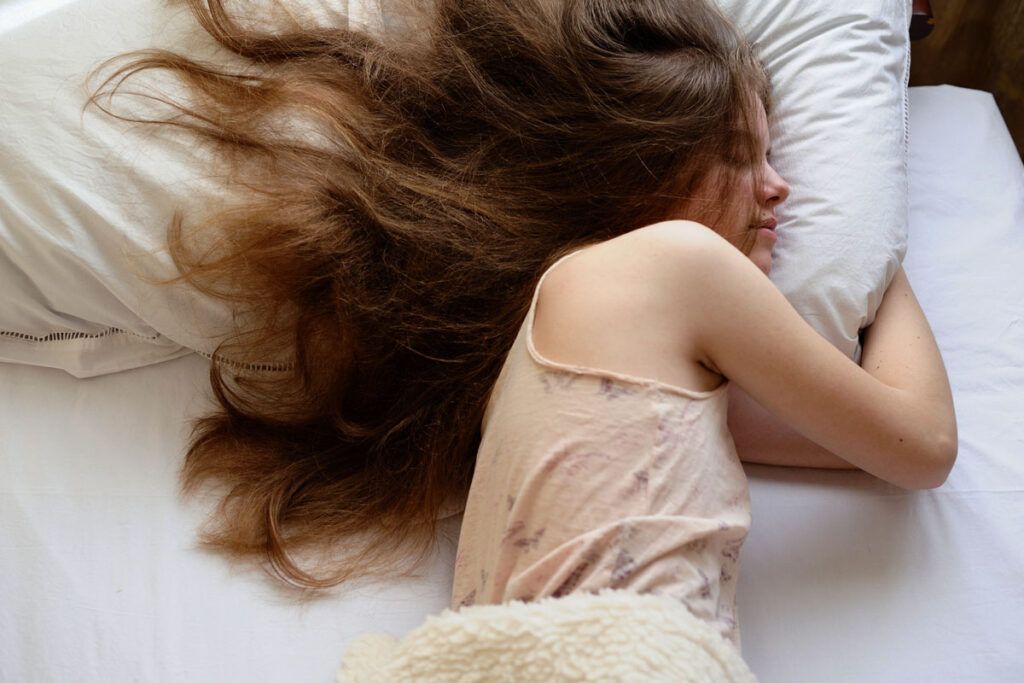Healthy hair and nails require sufficient protein, vitamins, and minerals. You can usually get these from a balanced diet.
Little evidence suggests that taking vitamins solely for hair and nails makes noticeable improvements if you already have a balanced diet.
What are the similarities between hair and nails?

Both hair and nails are important in protecting you from outside elements. Nails act as a protective plate over your fingertips, and hair acts as a filter to keep bacteria out and help keep the body warm.
Both hair and nails also contain a strong protein called keratin. This forms fibers that give nails and hair their toughness and strength.
Two types of keratin — known as types I and II — are determined by 54 genes in your body. Your nails and hair contain types I and II, also called alpha-keratin.
Specific nutrients are essential for the body to create keratin, and you can get these naturally from a balanced diet. There are no studies that conclude that keratin supplements can make your hair and nails stronger.
What nutrients benefit hair and nails?
Keratin helps form hair, nails, and the skin’s outer layer. It also helps support the skin, heal wounds, and keep the nails and hair healthy.
Other nutrients that both hair and nails benefit from are:
B vitamins
B-complex vitamins include B1, B2, B3, B5, B6, B7, B9, and B12.
B-complex vitamins help the body make energy from the food you eat and allow the body to absorb that energy. They help form red blood cells, which transport energy and nutrients to the rest of your body.
These vitamins also help turn nutrients and energy from glucose and fats into chemical energy that the body can use to form new proteins, like keratin. This means vitamin B is essential for healthy hair and nails.
Vitamin C
Vitamin C is an antioxidant that protects cells.
Antioxidants promote hair growth, maintain healthy cuticles, and increase blood flow to the scalp cells and nails, allowing for keratin production.
Vitamin D
Vitamin D helps prevent hair loss and encourages strong and healthy hair and nails. It also helps the body absorb calcium.
Iron
Iron helps transport oxygen around the body.
People with iron deficiency commonly have hair loss, anemia, and brittle nails. This is due to the lack of blood flow and essential nutrients to the scalp and nails, causing them to weaken.
Zinc
Zinc is important to the immune system. One of the symptoms of zinc deficiency is hair loss and brittle nails.
Not enough zinc can also lead to a weakened immune system, leaving the nail and hair follicles more susceptible to damage. This may also cause hair to fall out and nails to become weak.
Where do we get the nutrients we need for hair and nails?
We get the nutrients we need for hair and nails from the foods we eat as part of a balanced diet. The Dietary Guidelines for Americans 2020–2025 advise that adults get 1.5–2 cup-equivalents of fruits and 2–3 cup-equivalents of vegetables each day. In 2019, only 1 in 10 adults met one of these recommended daily fruit and vegetable intakes.
This means that many people in the United States do not reach micronutrient requirements from food alone, and could mean supplementing your diet with vitamins if you cannot reach the recommended fruit and vegetable guidance.
However, the role of vitamins is to balance out deficiencies in the nutrients our bodies naturally produce, not replace them. There is also little research on the effectiveness of some supplements, but some studies support the use of certain ingredients for hair growth and health, such as DHA omega-3s.
Beneficial foods for healthy hair and nails
Adding the following foods to your diet may benefit healthy hair and nails.
Proteins
Proteins from animal sources provide B vitamins. These include meat, eggs, and dairy products.
Plant-based proteins include:
- tempeh
- tofu
- lentils
- potatoes
- chickpeas
You can also find vitamin B in leafy greens, beans, peas, and some cereals.
Citrus fruits and cruciferous vegetables
Citrus fruits, acidic fruits, and cruciferous vegetables like broccoli, cauliflower, Brussels sprouts, and cabbage are rich in vitamin C.
Dairy products and fish
Dairy products, fats, and exposure to the sun provide you with vitamin D. Additionally, some manufacturers fortify plant-based alternatives with vitamin D, like soy milk, almond milk, and oat milk.
Fatty fish and fish liver oils are also among the best natural vitamin D sources.
Red meat and leafy greens
A variety of foods contain iron. It is most abundant in red meat, leafy greens, and cereals that manufacturers label high in iron.
Seafood and organ meats are also rich in iron. Dried fruits like prunes, raisins, and apricots are a suitable alternative for vegetarians, as are tofu, beans, and peas.
Nuts, eggs, and whole grains
Most red meats, seafood, nuts, eggs, and whole grains are good sources of zinc. Zinc is also present in many fruits and vegetables.
If you need help covering the cost of medications, the free Optum Perks Discount Card could help you save up to 80% on prescription drugs. Follow the links on drug names for savings on that medication, or search for a specific drug here.
